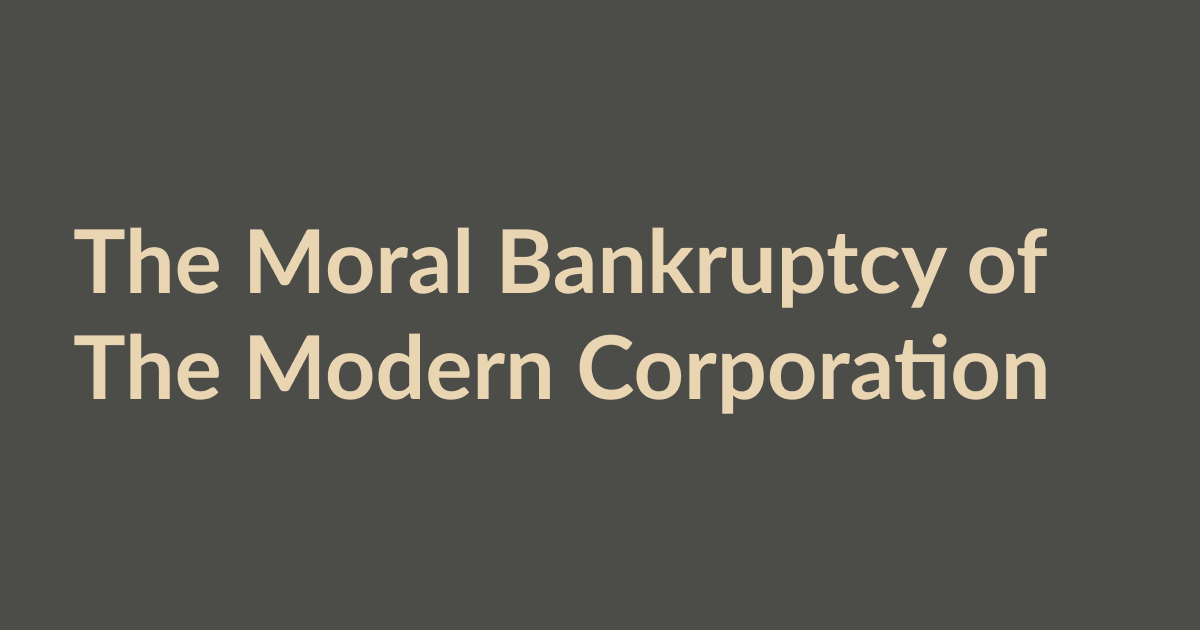- Loud Leaving
- Posts
- The Moral Bankruptcy of The Modern Corporation
The Moral Bankruptcy of The Modern Corporation
When Legal Compliance Becomes the Ceiling, Not the Floor

It was the 552ⁿᵈ consecutive day that I woke up thinking that today would be the day. It had happened to others on at least four occasions, but it never hit me.
Before I could make it to my work laptop, my phone chimed, indicating a new email message. I looked at my phone to see that it had finally happened.
I got laid off.
No more living in constant fear. No more checking my email every single day, wondering.
It was cold, calculated, and final.
My two years and seven months of service were reduced to an impersonal email, a severance package, and notice that I would lose computer access in less than 90 minutes.
But at least it was over.
The relationship between employers and employees in corporate America is fundamentally broken.
With the absence of shared respect, loyalty, and shared prosperity, we are witnessing a modern-day feudalism, where workers are de facto serfs and corporations and executives are the unaccountable lords of the manor.
Look no further than the headlines, where CEOs will lay off 10,000 people on Tuesday and celebrate record profits on Wednesday. Same week. Same breath. Same sociopathic smile in the boardroom.

Smile (movie). Source: Giphy
The only thing preventing outright exploitation of the modern-day worker is the thin veneer of legal compliance. Yeah, you read that right. Not a strong moral compass. Not strong ethics. The law.
These overlords do what they are legally obligated to do. No more.
And when the law becomes the sole arbiter of how human beings should be treated in the workplace, we have crossed a dangerous threshold that signals not just the failure of individual companies, but the moral bankruptcy of the entire system.
The problem is that people aren't seen as humans, but as resources.
The language used by these companies reveals a disturbing dehumanization: employees are "resources" to be "rightsized," "redundancies" to be "eliminated," or "costs" to be "optimized."
It's like they hired George Orwell to run their PR department.
This linguistic sleight of hand allows decision-makers to distance themselves from the human consequences of their choices, creating a psychological buffer that enables them to sleep soundly while their former employees lie awake wondering how they will pay their mortgages.
The new employment contract (Spoiler: Calling it a contract is misleading)
Here's the deal modern companies offer you:
You give them your unqualified and unequivocal loyalty. Additionally, you give them your time, energy, creativity, and dedication, even when it means setting aside time away from your family and hobbies.
They give you a box of swag to wear, a stupid pet name (like Twilions for Twilio employees), health insurance, and a paycheck, all of which can be taken away at any time for any (legal) reason.
At face value, this seems like a fair exchange.
But when you look a layer deeper, you'll see that it isn’t. And to break free of this isn’t as simple as it looks. The costs of employer-paid social security taxes and health insurance premiums alone are enough to give someone pause.
There is an asymmetric power dynamic. Employees need the protections of health insurance and a paycheck more than employers need employees. And the moment market conditions shift, the moment a new technology emerges, or the moment a consultant suggests that margins could be improved by reducing headcount, these same employees who were told they were "family" discover just how disposable they really were.
Living in fear (It's the new normal)
People are afraid of being unemployed. And as we have seen, for good reason. They need health insurance and a means to put a roof over their head.
Companies exploit this and gain compliance through fear.
Do as they say or else.
Every employee in America lives with this low-level dread humming in the background. You know your job security has nothing to do with how hard you work or how much value you create. It depends on whether some overpaid, tone-deaf executive with a spreadsheet decides your department is "redundant."

Office Space. Source: Giphy
This one-sided arrangement has created a workplace culture built on fear rather than trust. Employees know that a merger, an economic downturn, or simply a new CEO with different priorities could render their years of service meaningless overnight. This knowledge fundamentally changes how people approach their work, creating an environment where genuine engagement becomes increasingly rare and self-preservation becomes the primary motivator.
Here's the kicker: This approach is terrible for business. When you treat people like garbage, you get garbage results.
If you want loyalty, give loyalty.
The consequences of a transactional mindset extend far beyond individual companies. When large segments of the workforce cannot count on stable employment, it undermines the social contract that holds democratic societies together.
This isn't just about jobs—it's about the kind of society we want to live in.
The path forward (Spoiler: It requires brave leadership)
Real change means business leaders need to grow some moral backbone. Stop hiding behind "fiduciary duty" and "shareholder value" when you're making decisions that destroy lives.
Fucking own it.
Ask yourself: Is this decision right, not just legal? Will this help people flourish, not just boost next quarter's numbers? If people are your most valuable asset, treat them that way.
Start measuring success by more than stock price. How about employee well-being? Or whether you can sleep at night without Ambien?
If you laid people off this year, you aren’t entitled to a seven-figure bonus. And if you take it, you are an asshole.
And stop hiding behind the law. Laws should be the floor, not the ceiling.
The legal framework that governs employment relationships was never intended to serve as the sole foundation for human decency in the workplace. Employment law represents the bare minimum standard below which society has decided employers cannot sink, not the aspirational goal toward which they should strive.
When companies treat legal compliance as their ceiling rather than their floor, they reveal a fundamental misunderstanding of what it means to lead human beings rather than simply manage resources
This isn't naive idealism—it's basic human decency. Having people live in constant fear is dehumanizing, demoralizing, and just wrong.
The choice
When shareholder value becomes the sole measure of success, when quarterly earnings reports drive all decision-making, and when executives are rewarded primarily for short-term financial performance, it becomes almost inevitable that human considerations will be subordinated to financial ones.
So here's where we stand: Business leaders can change course now, voluntarily, before the whole system collapses under its own moral bankruptcy.
This transformation requires business leaders to question not just whether a particular decision is legal or profitable, but whether it is right.
It means considering not just the impact on shareholders, but also the impact on employees, their families, and the communities in which they live.
It means understanding that sustainable business success depends on creating value for all stakeholders, not just extracting maximum value for a privileged few.
The solution to this crisis cannot come from regulation alone, though stronger worker protections are certainly part of the answer.
The fundamental change needed is a transformation in how business leaders perceive their role and responsibilities. This means recognizing that the power to hire and fire comes with corresponding moral obligations, that the decision to build a business necessarily involves accepting responsibility for the welfare of the people who make that business possible, and that true leadership requires considering the human consequences of business decisions, not just their financial implications.
The bottom line
A system that depends on legal coercion to prevent the worst abuses while offering no positive vision of what employment relationships could be will eventually collapse under the weight of its own contradictions.
Employees will continue to disengage, the most talented individuals will seek alternatives, and companies will find themselves trapped in a downward spiral of declining performance and increasing dysfunction. The only question is whether business leaders will recognize this reality and change course voluntarily, or whether change will be forced upon them by circumstances beyond their control.
If business leaders cannot find ways to treat their employees with basic human decency without being compelled to do so by law, they will have forfeited any claim to moral legitimacy.
The choice facing today's business leaders is ultimately a choice about what kind of society we want to live in.
Do we want a world where human beings are valued only for their immediate economic utility, where relationships are purely transactional, and where the threat of economic displacement hangs over everyone who depends on employment for their livelihood?
Or do we want a world where work provides not just income but dignity, where employers and employees are genuine partners in creating value, and where business serves as a force for human flourishing rather than just wealth extraction?
And maybe, just maybe, if businesses operate differently, they build for decades, not quarters.
Your employees are watching. Your competitors are listening. History is keeping score.
What story do you want to tell?